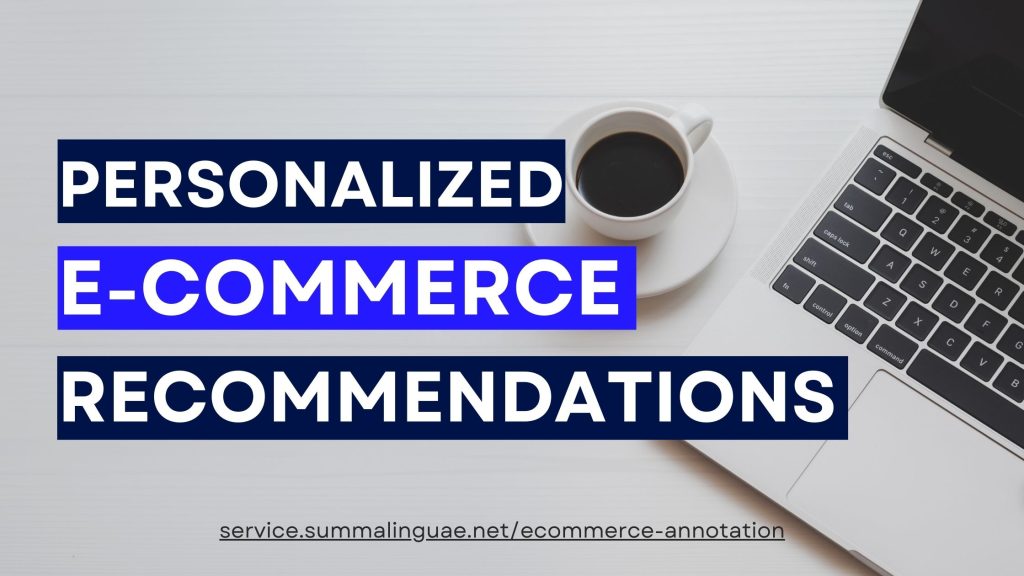
Data annotation help your analyze and understand customer preferences, sentiments, and behaviors from textual data, leading to more accurate, relevant, and personalized e-commerce recommendations.
A 2021 study by McKinsey says 78% of shoppers chose to pay more for brands that provide personalized services. It’s a feature that’s only growing in popularity and efficacy.
A crucial component in achieving this level of personalization is data annotation, particularly when catering to diverse audiences across multiple languages.
Let’s delve into how data annotation drives personalized recommendations and addresses common client concerns through practical examples.
Data Annotation for Personalized E-Commerce Recommendations
Data annotation plays a crucial role in enabling personalized shopping recommendations on e-commerce platforms by extracting valuable insights from textual data. Here’s how it works.
Understanding Customer Preferences
Text data annotation helps in identifying and categorizing customer preferences, such as product interests, brand affinity, style preferences, size requirements, and more. For example, annotating customer reviews and feedback allows the system to understand what customers like or dislike about specific products.
Semantic Analysis
Annotation of text data involves semantic analysis, where the meaning and context of words and phrases are understood. This helps in identifying subtle nuances in customer preferences and sentiments, leading to more accurate recommendations.
For instance, understanding the difference between “good quality” and “affordable price” in customer reviews helps in offering relevant recommendations.
Language Processing
Multilingual text data annotation enables e-commerce platforms to cater to diverse customer bases by understanding and processing text data in multiple languages. This ensures that personalized recommendations are delivered in the customer’s preferred language, enhancing user experience and engagement.
Contextual Recommendations
Text annotation also facilitates contextual recommendations by capturing the context in which certain products or services are mentioned. For example, annotating text data related to occasions (like weddings, birthdays, holidays) helps in offering personalized recommendations for gifts or event-specific products.
User Behavior Analysis
Annotations of user-generated content, such as search queries, browsing history, and interactions with the platform, provide valuable insights into user behavior. This data is then used to personalize recommendations based on past actions and preferences.
Dynamic Updates
Text data annotation allows for dynamic updates and adjustments to recommendation algorithms based on real-time feedback and evolving customer preferences. This ensures that recommendations remain relevant and effective over time.
Text data annotation therefore enables e-commerce platforms to analyze and understand customer preferences, sentiments, and behaviors from textual data, leading to more accurate, relevant, and personalized shopping recommendations.
The Impact of Multilingual Personalized E-Commerce Recommendations
Imagine a scenario where an online shopper from France receives product recommendations tailored to their preferences, all in French. At the same time, a shopper from Japan is presented with the same level of customization, but in Japanese. This seamless multilingual experience is made possible by a robust recommendation system powered by data annotation.
Our team of annotators, guided by technical project managers well-versed in AI technologies, captures and analyzes user preferences across languages. This process enables e-commerce platforms to offer tailored product recommendations that resonate deeply with diverse audiences worldwide.
Let’s explore how this process benefits e-commerce businesses and addresses client concerns through concrete examples:
Enhancing User Experience
Personalized recommendations, driven by data annotation services, significantly enhance the user’s experience.
Imagine a clothing retailer implementing personalized recommendations based on customer browsing history and preferences. Before the implementation, users may have struggled to find items that truly matched their style and size preferences.
However, after integrating personalized recommendations, customers now receive curated suggestions that align perfectly with their tastes, leading to a smoother and more satisfying shopping experience.
Boosting Conversion Rates
One of the most substantial benefits of personalized recommendations is their impact on conversion rates.
Consider an electronics store that introduces personalized product recommendations based on customers’ past purchases and browsing behavior. Before this implementation, customers may have browsed multiple products without making a purchase decision.
However, with personalized recommendations highlighting items relevant to their interests, customers are more likely to convert and complete a purchase, resulting in a notable increase in conversion rates.
Fostering Customer Loyalty
Tailored product suggestions play a crucial role in fostering customer loyalty.
Take the example of a beauty brand that implements personalized recommendations based on a customer’s skincare concerns and preferences. Before this implementation, customers may have explored various products without feeling a strong connection to the brand.
However, with personalized recommendations showcasing products tailored to their specific needs, customers feel understood and valued, leading to increased loyalty and repeat purchases.
Gaining a Competitive Edge
Implementing personalized recommendations not only enhances the customer experience but also provides a competitive advantage.
Consider a furniture retailer that leverages data annotation to offer personalized recommendations based on customers’ home decor preferences and style choices.
While competitors may offer generic suggestions, this retailer stands out by providing tailored recommendations that resonate with customers, ultimately attracting and retaining a loyal customer base and gaining a significant edge in the market.
Driving Cross-Selling and Upselling Opportunities
Personalized recommendations also create valuable opportunities for cross-selling and upselling. Imagine a grocery store that implements personalized recommendations based on customers’ dietary preferences and shopping habits.
By suggesting complementary products or premium alternatives based on customer preferences, the store can increase average order value and drive revenue growth while providing customers with a more personalized and satisfying shopping experience.
How We Can Help with Personalized E-Commerce Recommendations
Elevate your e-commerce platform with our comprehensive annotation services: enrich product data, understand customer sentiment, and enhance search accuracy across languages for global success.


